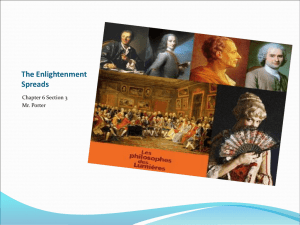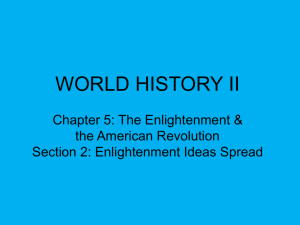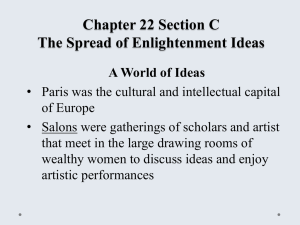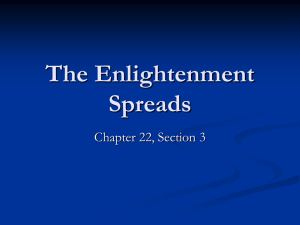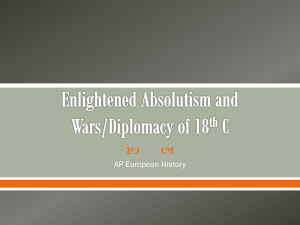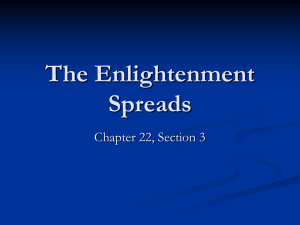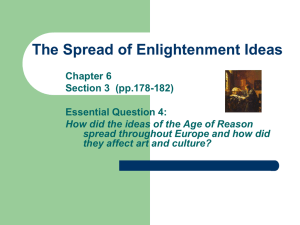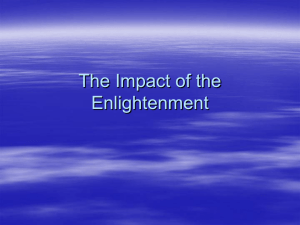AP Euro Study Guide -42- THE ENLIGHTENMENT Secular world
advertisement
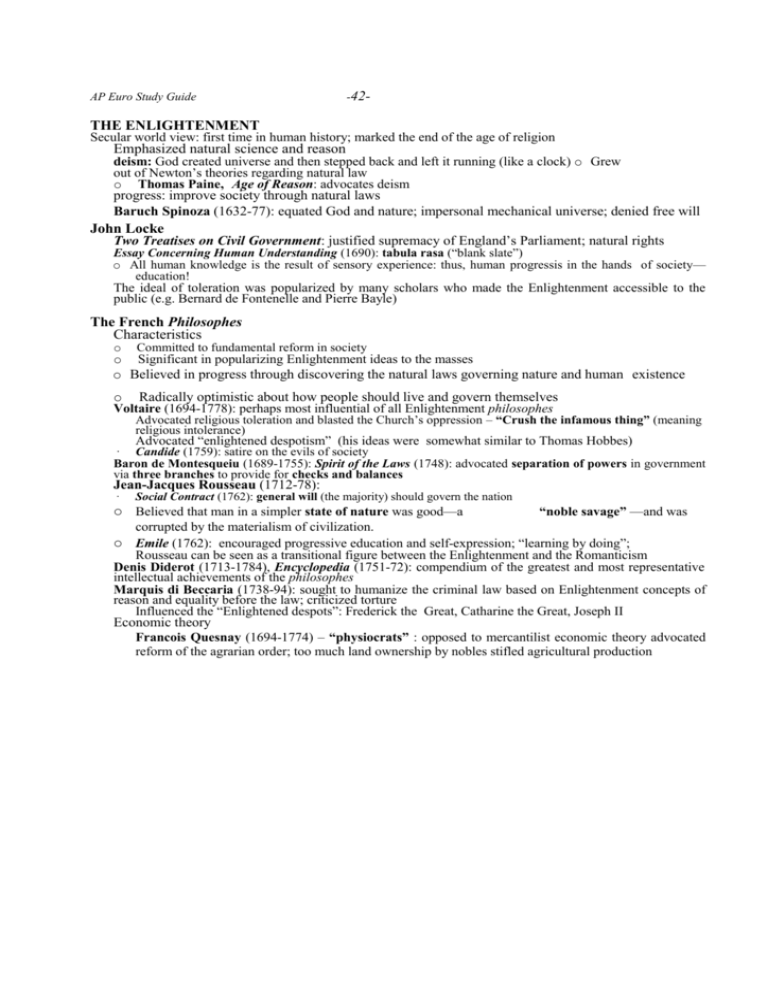
AP Euro Study Guide -42- THE ENLIGHTENMENT Secular world view: first time in human history; marked the end of the age of religion Emphasized natural science and reason deism: God created universe and then stepped back and left it running (like a clock) o Grew out of Newton’s theories regarding natural law o Thomas Paine, Age of Reason: advocates deism progress: improve society through natural laws Baruch Spinoza (1632-77): equated God and nature; impersonal mechanical universe; denied free will John Locke Two Treatises on Civil Government: justified supremacy of England’s Parliament; natural rights Essay Concerning Human Understanding (1690): tabula rasa (“blank slate”) o All human knowledge is the result of sensory experience: thus, human progressis in the hands of society— education! The ideal of toleration was popularized by many scholars who made the Enlightenment accessible to the public (e.g. Bernard de Fontenelle and Pierre Bayle) The French Philosophes Characteristics o Committed to fundamental reform in society o Significant in popularizing Enlightenment ideas to the masses o Believed in progress through discovering the natural laws governing nature and human existence o Radically optimistic about how people should live and govern themselves Voltaire (1694-1778): perhaps most influential of all Enlightenment philosophes Advocated religious toleration and blasted the Church’s oppression – “Crush the infamous thing” (meaning religious intolerance) Advocated “enlightened despotism” (his ideas were somewhat similar to Thomas Hobbes) · Candide (1759): satire on the evils of society Baron de Montesqueiu (1689-1755): Spirit of the Laws (1748): advocated separation of powers in government via three branches to provide for checks and balances Jean-Jacques Rousseau (1712-78): · Social Contract (1762): general will (the majority) should govern the nation o Believed that man in a simpler state of nature was good—a “noble savage” —and was corrupted by the materialism of civilization. o Emile (1762): encouraged progressive education and self-expression; “learning by doing”; Rousseau can be seen as a transitional figure between the Enlightenment and the Romanticism Denis Diderot (1713-1784), Encyclopedia (1751-72): compendium of the greatest and most representative intellectual achievements of the philosophes Marquis di Beccaria (1738-94): sought to humanize the criminal law based on Enlightenment concepts of reason and equality before the law; criticized torture Influenced the “Enlightened despots”: Frederick the Great, Catharine the Great, Joseph II Economic theory Francois Quesnay (1694-1774) – “physiocrats” : opposed to mercantilist economic theory advocated reform of the agrarian order; too much land ownership by nobles stifled agricultural production -43- AP Euro Study Guide Adam Smith (1727-1790): Wealth of Nations (1776): The “Bible” of capitalism; laissez faire Believed the economy is governed by the natural laws of supply and demand Women in the Enlightenment Several women played an important role in organizing salons Madame de Geoffren, Madame de Staël, and Louise de Warens o de Geoffren also played major role patronizing Diderot’s Encyclopedia Mary Wollstonecraft (1759-97): English woman who promoted political and educational equality for women Later Enlightenment: Became more skeptical Baron Paul d’Holbach (1723-1789): humans were machines governed by outside forces. Freewill, God, and immortality of soul were foolish myths; severe blow to unity of the Enlightenment David Hume (1711-76): emphasized limitations of human reasoning; human mind is nothing but a bundle of impressions; later became dogmatic skeptic that undermined Enlightenment Jean de Condorcet (1743-1794) Progress of the Human Mind His utopian ideas undermined the legitimacy of the Enlightenment o Rousseau believed rationalism and civilization was destroying rather than liberating the individual; emphasized nature, passion—influenced e arly Romantic movement · Immanuel Kant (1724-1794): Greatest German philosopher of the Enlightenment Separated science and morality into separate branches of knowledge. Science could describe natural phenomena of material world but could not provide a guide for morality Classical liberalism: the political and economic outgrowth of the Enlightenment Belief in liberty of the individual and equality before the law (but NOT democracy) “Natural rights” philosophy played a profound role in the American and French Revolutions of the late-18th century Impact of Locke and Montesquieu was clearly evident in the American Constitution and in the French Declaration of the Rights of Man Rousseau’s idea of the “general will” influenced th e French Revolution after 1791. Belief in laissez faire capitalism Belief in progress through reason and education Religious toleration Freedom of speech & the press Just punishments for crimes Equal treatment before the law Significance of the Enlightenment: leads to Emergence of a secular world view of the universe (for the first time in Western history) Enlightened despotism American and French Revolutions (as a result of classical liberalism) educational reform th laissez faire capitalism (in the 19 century) -44- AP Euro Study Guide New Christian groups opposed the Enlightenment German pietism: argued need for spiritual conversion and religious experience Methodism: taught need for spiritual regeneration and a moral life that would demonstrate the reality of the conversion o John Wesley (1703-91): founder of Methodism in England Jansenism (Catholic sect) in France argued against idea of an uninvolved or impersonal God ENLIGHTENED DESPOTISM – some monarchs adopted certain Enlightenment ideas Overview: In sum, reforms were made but very modest improvements occurred and life of the peasantry remained hard in the 18 th century. Progressive reforms included toleration of religious minorities, simplified legal codes, and promotion of practical education. Yet, Absolutists more vigorously sought reforms to strengthen the state and allow them to compete militarily with their neighbors. In essence, continued state building of their predecessors. “Frederick the Great” (Frederick II: 1740-1786) of Prussia At war for first half of his reign o · War of Austrian Succession (1740-1748) Prussia, France, Bavaria & Spain vs. Austria and Russia Took Silesia from Austria; Prussia now most powerful German state: “Great Power” Treaty of Aix-La-Chapelle (1748): legitimized Frederick’s conquest. Seven Years War (1756-1763) Prussia alone in fighting France, Russia & Austria (outnumbered 15-1) “Diplomatic Revolution of 1756 : Britain allied with Prussia (but of little value) while France allied with the Austrian Hapsburgs Peter III of Russia let Prussia off the hook at a critical moment Treaty of Paris (1763): Prussia retained Silesia; remained a “Great Power” Became a reformer during 2nd half of his reign – saw ruler as the “first servant of the state” · Reforms essentially geared to increase the power of the state o Religious freedom (although less so for Jews) o Promoted education in schools and universities o Codified laws o Ended serfdom on crown lands (peasants were needed for the army) o Improved state bureaucracy by requiring examinations for civil servants o Reduced censorship o Promoted industry and agriculture o Encouraged immigration Social structure remained heavily stratified: serfdom; extended privileges for the nobility, Junkers became heart of the military; difficult upward mobility for middle class leadership Catherine II of Russia (r. 1762-1798) “Catherine the Great” Least “enlightened” of the Enlightened Despots, alt hough one of greatest rulers in Euro history · Westernization: architecture, sculpture, music—supp orted the philosophes Reforms: o Reduced torture AP Euro Study Guide -45- · Allowed some limited religious toleration (Jews granted civil equality) · · Some educational improvement; more books published during her reign Increased local control Pugachev Rebellion (1773): largest peasant uprising in Russian history; · Catherine gained support from nobility by granting greater control over serfs: high point for nobles—low point for serfs Nobility was the only class that benefited from Catherine’s policies Territorial expansion · Annexed Polish territory: 3 partitions of Poland in 1772, 1793, and 1795 o In 17 century, effectiveness of Russian monarchs limited by vast Russian territories o Gained Ottoman land in the Crimea (controlled by Tartars) o Began conquest of Caucasus th Austria Maria Theresa (r. 1740-1780): NOT considered an “Enlightened des pot” o Wars of 1740s led to internal consolidation o She centralized control of the Hapsburg empire o Brought the Catholic Church in Austria under state control o Reduced serfdom (more than any other eastern European ruler except her son) o Promoted economic development o NOT enlightened as she did not support enlightenment ideas and did relatively less to support religious toleration Joseph II (r. 1765-1790): greatest of Enlightened despots (“ greatest good for greatest number”) o Abolished serfdom in 1781 o Freedom of press o Freedom of religion & civic rights to Protestants and Jews o More equitable justice system o Made German the official language (to assimilate minorities) o Increased control over Catholic education, expanded state schools Ultimately, left the empire in economic and political turmoil: Leopold II rescind many laws (e.g., serfdom) France: rise of aristocratic power and liberalism resulted in end of absolutism Louis XV (1715-1774): o Nobility gained influence during his reign o Madame de Pompadour: most famous mistress of the 18 th c. as she charmed the king and gained decision-making power o Parlement of Paris (partial to nobles) blocked Louis’ absolutist ambitions Consisted of many “nobility of the robe” Renè de Maupeou: dissolved Parlement of Paris Louis XVI (1774-1792) o Reinstated Parlement of Paris (due to strong public opinion) & dismissed Maupeau o Royal struggle with aristocracy and bourgeoisie resulted in the French Revolution.
